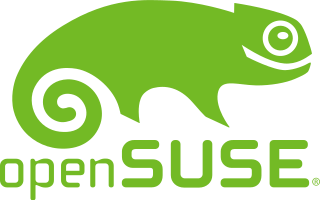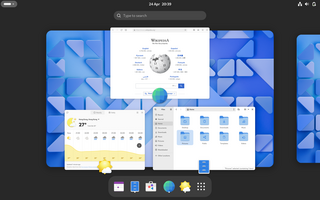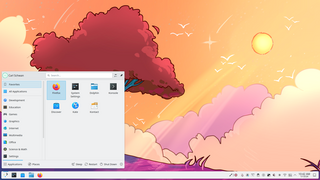
A Linux distribution is an operating system that includes the Linux kernel for its kernel functionality. Although the name does not imply product distribution per se, a distro, if distributed on its own, is often obtained via a website intended specifically for the purpose. Distros have been designed for a wide variety of systems ranging from personal computers to servers and from embedded devices to supercomputers.

In computing, a desktop environment (DE) is an implementation of the desktop metaphor made of a bundle of programs running on top of a computer operating system that share a common graphical user interface (GUI), sometimes described as a graphical shell. The desktop environment was seen mostly on personal computers until the rise of mobile computing. Desktop GUIs help the user to easily access and edit files, while they usually do not provide access to all of the features found in the underlying operating system. Instead, the traditional command-line interface (CLI) is still used when full control over the operating system is required.

Gambas is an object-oriented dialect of the BASIC programming language, and an integrated development environment that accompanies it. Designed to run on Linux and other Unix-like computer operating systems, its name is a recursive acronym for Gambas Almost Means Basic. Gambas is also the word for prawns in the Spanish, French, and Portuguese languages, from which the project's logos are derived.
freedesktop.org (fd.o), formerly X Desktop Group (XDG), is a project to work on interoperability and shared base technology for free-software desktop environments for the X Window System (X11) and Wayland on Linux and other Unix-like operating systems. Although freedesktop.org produces specifications for interoperability, it is not a formal standards body.

openSUSE is a free and open-source Linux distribution developed by the openSUSE project. It is offered in two main variations: Tumbleweed, an upstream rolling release distribution, and Leap, a stable release distribution which is sourced from SUSE Linux Enterprise.

SUSE Linux Enterprise (SLE) is a Linux-based operating system developed by SUSE. It is available in two editions, suffixed with Server (SLES) for servers and mainframes, and Desktop (SLED) for workstations and desktop computers.

SUSE S.A. is a German multinational open-source software company that develops and sells Linux products to business customers. Founded in 1992, it was the first company to market Linux for enterprise. It is the developer of SUSE Linux Enterprise and the primary sponsor of the community-supported openSUSE Linux distribution project.

KDE Plasma 4 is the fourth generation of the KDE workspace environments. It consists of three workspaces, each targeting a certain platform: Plasma Desktop for traditional desktop PCs and notebooks, Plasma Netbook for netbooks, and Plasma Active for tablet PCs and similar devices.

LXDE was a free desktop environment with comparatively low resource requirements. This makes it especially suitable for use on older or resource-constrained personal computers such as netbooks or system on a chip computers.

GNOME originally an acronym for GNU Network Object Model Environment, is a free and open-source desktop environment for Linux and other Unix-like operating systems.

Fuduntu Linux was a Fedora-based Linux distribution created by Andrew Wyatt. It was actively developed between 2010 and 2013. It was designed to fit in somewhere between Fedora and Ubuntu. It was notable for providing a 'classic' desktop experience. Although it was optimized for netbooks and other portable computers, it is still a general-purpose OS.

Cub Linux was a computer operating system designed to mimic the desktop appearance and functionality of ChromeOS. It was based on Ubuntu Linux LTS 14.04 "Trusty Tahr". It used Openbox as the window manager and tools taken from LXDE, Gnome, XFCE as well as a number of other utilities. It was a cloud-centric operating system that was heavily focused on the Chromium Browser. Cub Linux's tagline was "Cub = Chromium + Ubuntu".

MSP360, formerly CloudBerry Lab, is a software and application service provider company that develops online backup, remote desktop and file management products integrated with more than 20 cloud storage providers.

Collabora Online is an open source online office suite based on LibreOffice, enabling web-based collaborative real-time editing of word processing documents, spreadsheets, presentations, and vector graphics. Optional apps are available for desktops, laptops, tablets, smartphones, and Chromebooks.

KDE Plasma is a set of graphical shells developed by KDE for Unix-like operating systems. With the KDE brand repositioning in 2009, Plasma 4.4 succeeded KDE 4.3. Currently, it has four workspace variants: one for desktop PCs and laptops, one for TVs, one for smartphones, and another for embedded and touch-enabled devices. Plasma Desktop, in its default configuration, resembles KDesktop from K Desktop Environment 3 and Microsoft Windows XP; however, extensive configurability allows radical departures from the default layout.















